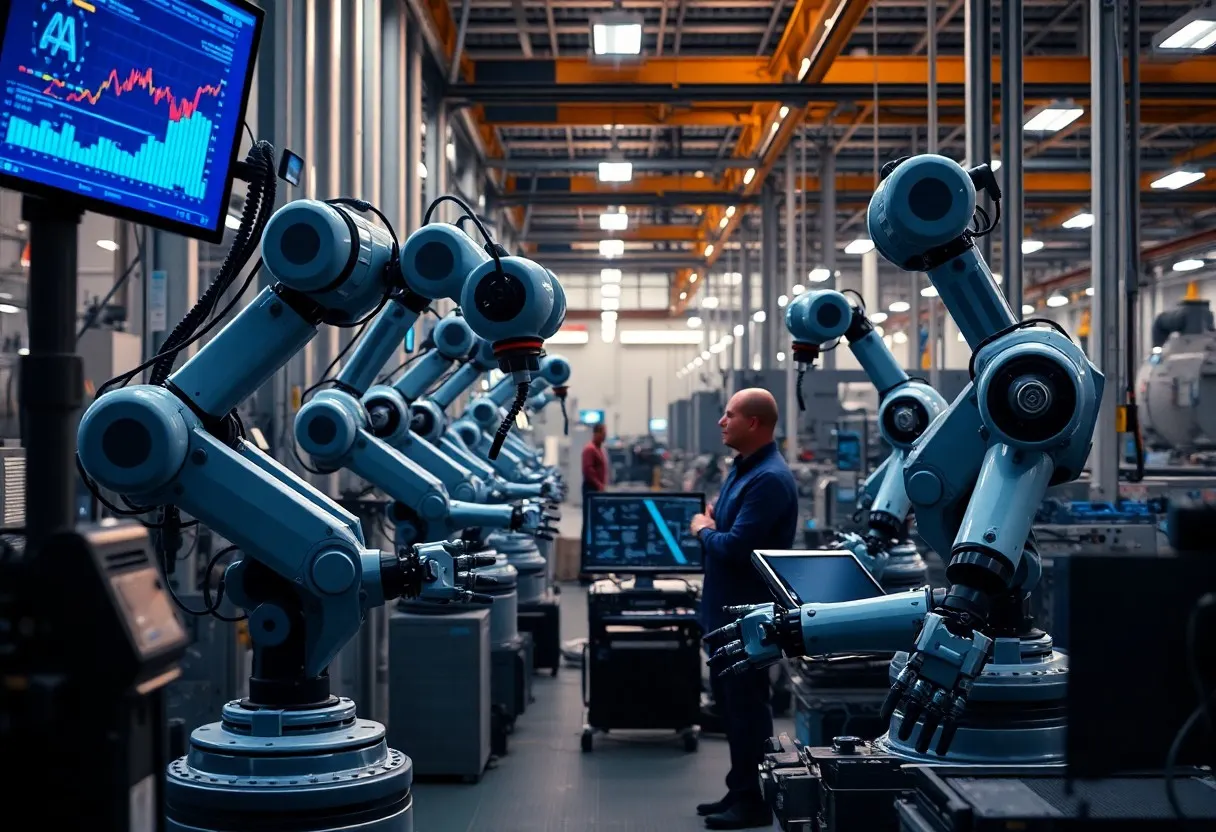AI Trends Shaping The Future Of Business Innovation
Trends in artificial intelligence are dynamically influencing the landscape of business innovation today, and I believe it's vital for you to stay informed about these developments. As AI technology advances, I see opportunities that can streamline operations, enhance customer experiences, and drive strategic decision-making in your organization. In this post, I will explore key AI trends that are not only reshaping industries but also paving the way for future advancements that you can leverage for your business growth.
Decoding AI Reinvention in Business Landscapes
AI is rapidly transforming traditional business landscapes, making processes more efficient and innovative. Organizations are reallocating resources and reshaping their operational frameworks to harness the power of AI technologies. By integrating AI into their strategies, companies can achieve a competitive edge, facilitating enhanced productivity and creating new avenues for growth. The shift towards AI-driven environments is not merely a trend; it indicates a profound transformation that continuously evolves the way businesses operate and interact with consumers.
The Role of Machine Learning in Customer Insights
Machine learning plays a pivotal role in deriving actionable customer insights, allowing businesses to understand consumer behavior on a granular level. With sophisticated algorithms, companies can analyze vast datasets to identify patterns, preferences, and potential future actions of customers. This intelligence feeds into personalized marketing strategies, resulting in higher engagement rates and improved customer satisfaction. For instance, businesses that utilize machine learning often report significant increases in conversion rates due to enhanced precision in targeting audiences.
Revolutionizing Decision-Making Processes with AI Algorithms
AI algorithms are profoundly revolutionizing decision-making processes across various industries. These algorithms enable businesses to sift through vast amounts of data at unprecedented speeds, identifying trends and insights that human analysts may overlook. Decision-makers are increasingly relying on predictive analytics to formulate strategies, mitigate risks, and seize opportunities. For instance, companies like Amazon leverage AI to optimize inventory management, resulting in a 20% reduction in costs while enhancing delivery speed. Such advancements signal a shift away from intuition-based strategies to data-driven decision-making.
AI algorithms are not just enhancing decision-making; they’re redefining it. Consider how data-centric companies like Google employ machine learning to forecast market trends with remarkable accuracy, leading to optimized product launches. Businesses utilizing AI-powered insights enjoy improved operational agility, enabling them to adapt swiftly to changing market dynamics. Through simulation and forecasting, AI empowers firms to explore various scenarios before committing resources, effectively minimizing missteps and maximizing returns. This strategic integration of AI reaffirms its position as an indispensable tool for future-ready enterprises.
Automation: The Double-Edged Sword of Efficiency
Automation presents a remarkable opportunity for businesses to streamline operations and reduce costs, yet it also poses significant challenges regarding workforce management. While machines and software can enhance productivity, they're equally capable of displacing workers, creating a tension between operational efficiency and employment stability. Companies must navigate this delicate balance to harness the benefits of automation without sacrificing their human resources, fostering a workplace culture that embraces technology while valuing human contributions.
Balancing Workforce Dynamics in an Automated World
Striking a balance between automation and workforce dynamics requires a shift in corporate culture. Leaders must adopt strategies that not only incorporate automated systems but also prioritize upskilling and reskilling initiatives for their employees. By doing so, organizations can create an adaptable workforce capable of thriving alongside AI technologies, thus ensuring that human talent remains a vital component of their operational success.
Emerging Jobs: New Opportunities in AI-Driven Markets
The rise of AI is not just a harbinger of job losses; it also heralds a wave of new opportunities tailored to meet the needs of an evolving marketplace. Positions in AI ethics, data analysis, and machine learning engineering are increasingly in demand, reflecting a shift toward more specialized roles that blend technical skills with creative problem-solving capabilities.
For instance, roles in AI training and maintenance are emerging as critical components in various sectors, including healthcare and finance. The U.S. Bureau of Labor Statistics projects that employment in computer and information technology occupations will grow by 13% from 2020 to 2030, significantly higher than the average for all occupations. As businesses continue to integrate AI technologies into their operations, professionals equipped with inter-disciplinary skills—combining AI knowledge with industry-specific expertise—will find themselves in high demand, further facilitating innovation and shaping the future job landscape.
Personalization at Scale: The Future of Customer Engagement
In an era where customers expect tailored experiences, leveraging AI for personalization at scale is becoming a game changer. By analyzing vast amounts of data in real-time, businesses can not only understand customer preferences but also predict future behaviors. This shift towards hyper-personalization fosters deeper connections with consumers, transforming ordinary transactions into memorable engagements that drive loyalty and satisfaction.
Hyper-Personalized Marketing Strategies Powered by AI
Utilizing AI in marketing can refine how you engage with customers. By harnessing machine learning algorithms, you can create campaigns tailored not only to demographics but also to individual behaviors. Dynamic content suggestions, targeted email campaigns, and personalized product recommendations are just some examples of how AI can elevate your marketing strategies to meet specific consumer demands effectively.
Case Studies of Successful AI-Driven Customer Journeys
Numerous brands have successfully integrated AI-driven customer experiences that yield impressive results, demonstrating the effectiveness of personalized strategies. For instance, companies like Amazon and Netflix have leveraged AI to recommend products and content to users, leading to significant increases in sales and viewer retention. Analyzing these case studies provides valuable insights into how to implement similar initiatives in your business.
- Amazon: Implemented AI-driven recommendation systems that account for 35% of total sales.
- Netflix: Customized content recommendations have led to a 75% increase in viewer engagement and loyalty.
- Sephora: Utilized machine learning for personalized beauty routines, achieving a 20% lift in conversion rates.
- Starbucks: AI-driven mobile app recommendations increased customer spending by 13% through personalized offers.
- Spotify: Personalized playlists like "Discover Weekly" boost user retention to over 40 million active users monthly.
Diving deeper into these case studies reveals a consistent theme: personalized experiences lead to higher customer engagement and satisfaction. Each brand, through data-driven insights, tailored its approach to individual preferences. This strategy not only nurtured a loyal customer base but also significantly elevated revenue streams. Harnessing the same principles can help you craft a more personalized journey for your customers, ultimately driving long-term business success.
Ethical Considerations: Navigating the AI Responsibility Frontier
As businesses increasingly leverage AI for innovation, ethical considerations play an undeniable role in shaping future practices. Balancing technological advancement with social responsibility ensures that organizations not only drive efficiency but also foster trust among consumers and stakeholders. By focusing on inclusivity, fairness, and transparency, businesses can navigate this complex landscape while positioning themselves at the forefront of responsible AI implementation.
Mitigating Bias in AI Systems and Business Practices
Addressing bias in AI systems is necessary to ensure equitable outcomes. Training AI algorithms on diverse datasets helps prevent outcomes that favor one demographic over another. For example, consider a company relying on AI-driven hiring practices; incorporating a wide range of candidate profiles can enhance the applicant pool, leading to more diverse and innovative teams.
Establishing Trust: Transparency and Accountability in AI
Transparency in AI operations cultivates trust between businesses and customers. For instance, informing clients how their data is used and the logic behind AI-driven decisions demystifies the technology. Implementing clear accountability measures, such as third-party audits, further reassures consumers that AI outputs align with ethical standards.
Establishing trust is about more than providing information; it’s also about demonstrating commitment to ethical practices. Companies can enhance transparency by publishing reports detailing AI system performance, including metrics on bias detection and mitigation efforts. By fostering open dialogues on algorithmic decision-making processes, organizations can invite customer feedback while ensuring they remain accountable for AI outcomes. As more consumers prioritize brands that uphold ethical standards, transparency becomes a competitive advantage, paving the way for long-term relationships founded on integrity.

Future-Proofing Your Business: Strategies for Embracing AI Innovations
Adapting to the rapidly evolving landscape of AI is vital for sustaining business growth in the future. Developing a forward-thinking strategy focused on continuous innovation, talent development, and adopting the latest AI technologies will ensure that you remain competitive. Engaging in partnerships with AI startups, investing in R&D, and fostering a culture of experimentation are powerful techniques that empower organizations to seize AI opportunities as they arise.
Building Agile Organizations to Adapt to AI Trends
Your organization's ability to pivot and respond to AI advancements hinges on its agility. Implementing agile methodologies across teams fosters collaboration, quick decision-making, and responsiveness to market changes. By empowering employees with autonomy and integrating cross-functional teams, I have seen how organizations can efficiently harness AI innovations to enhance products and services.
Investment Trends: Where to Allocate Resources in AI Integration
Identifying where to direct resources for AI initiatives can significantly impact your integration success. Focusing investments on areas such as machine learning infrastructure, talent acquisition, and AI-friendly software tools can yield high returns. In addition, I’ve observed that companies prioritizing training programs for existing employees tend to build strong internal capabilities, allowing for smoother transitions into AI-focused processes.
To effectively allocate resources for AI integration, consider analyzing specific areas of your business that could be optimized through automation and data analytics. For instance, investing in predictive analytics tools can enhance supply chain efficiency while creating better customer experiences. Developing in-house talent through training initiatives enhances your team’s capability to leverage AI technologies effectively. Furthermore, collaborating with AI solution providers offers insights and accelerates deployment while mitigating risks associated with technology adoption. Each of these strategies not only drives immediate value but also lays the groundwork for sustainable innovation in the years to come.
Final Words
Drawing together the insights from this exploration of AI trends, I believe it’s clear that embracing these advancements can significantly enhance your business innovation. By integrating AI technologies into your strategies, you can streamline processes, improve customer experiences, and gain a competitive edge. As the landscape continues to evolve, you have the opportunity to leverage these trends for sustained growth and success. Your journey into the future of business innovation starts here, and I'm excited to see how you will shape it with AI.
















